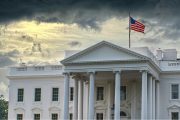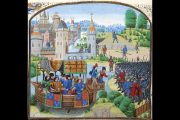
April 19 is an important date in American history, as three momentous events happened on that date — the beginning of the American Revolutionary War in 1775; the assault of the Federal Bureau of Investigation on a religious compound in Waco, Texas, in 1993; and the bombing of the Alfred P. Murrah federal building in Oklahoma City in 1995.
It was in 1775 that, in the words of the poet Ralph Waldo Emerson, the “embattled farmers stood, and fired the shot heard ‘round the world.” Sadly, far too many Americans have little idea what that first confrontation at Lexington, followed by the one at Concord, was all about. Ask the average American, and one is more likely to be told that the war was fought in opposition to the British practice of “taxation without representation.”
That certainly was part of it, but the battles of April 19, 1775 had their genesis in several acts of Parliament passed in 1774 in response to the Boston Tea Party of December 16, 1773. In laws they called the Coercive Acts (the American Patriots dubbed them the Intolerable Acts), Britain closed the port of Boston until all the tea was paid for; town government was abolished; and a military dictator was placed over Massachusetts.
Aware that within the city of Boston there were many Americans prepared to resist such tyranny, General Thomas Gage knew that he needed to confiscate any arms that the people might be harboring in their homes. (All tyrants know this is necessary, from Adolf Hitler to Fidel Castro.) Gage eventually took 1,778 firearms, 634 pistols, and 978 bayonets from the people of Boston.
Samuel Adams declared such efforts a violation of the British Constitution and the English Bill of Rights, citing William Blackstone, who said that arms are necessary to allow for the “natural right of resistance and self-preservation,” and serve as “barriers to protect … personal security, personal liberty, and private property.”
Resist is what the Americans intended to do. But without arms, resistance would be as futile as when the Hungarians tried to oust the Soviet Union from their country in 1956, as rocks were largely ineffective against Russian tanks. Therefore, the patriots began to stockpile weapons about 20 miles away from Boston, at Concord. Gage found out about it, and on the night of April 18-19, 1775, dispatched British redcoats to seize those weapons to, in Gage’s words, “nip the rebellion in the bud.”
But the patriots also had their own “intelligence network,” and Paul Revere and others alerted the patriots, who met the British regulars, first at Lexington, and then at Concord, and fired the shots “heard ‘round the world.”
It should be stressed that all the Americans’ shots were fired with unregistered guns — and with guns that were, literally, “weapons of war.” That was the point. Without “weapons of war” in the hands of the general population, tyrants are largely free to impose their will as they wish on that population.
Almost two-hundred and eighteen years later, on February 28, 1993, agents of the Bureau of Alcohol, Tobacco, and Firearms (ATF) launched an ill-advised dawn raid on a religious compound outside Waco, Texas, with the purpose of seizing privately owned weapons held by members of the Branch Davidian sect. Of course, just as Gage did in Boston, the government declared these weapons to be “illegal.” Many questions still remain about that raid, which resulted in the deaths of several ATF agents and Branch Davidians. Then, three weeks later, on April 19, 1993, the Federal Bureau of Investigation (FBI) launched a military-style assault on the compound when its inhabitants failed to surrender.
While there is still controversy today as to its cause, there is no debate that the raid resulted in a fireball that swept through the compound, killing dozens of Davidians, including many children.
Many in America were enraged, wondering why the raid by the ATF and assault by the FBI were necessary, but one person — Timothy McVeigh — acting in concert with, in the words of the federal grand jury that indicted him, “others unknown,” took revenge on April 19, 1995, blowing up the federal building in downtown Oklahoma City. The building housed offices of Social Security, Housing and Urban Development, and the ATF. It also had a daycare center, leading many to speculate that McVeigh wanted to murder children in an act of revenge for the FBI’s raid two years earlier that led to the deaths of innocent children outside Waco.
Unfortunately, McVeigh’s actions only emboldened those who want to confiscate firearms from private American citizens, as though McVeigh (and “others unknown”) blew up the federal building with a Glock or a Colt revolver.
Three events — all happening on April 19. There are lessons to be learned from all these events.
The first lesson is that tyrants always want to disarm the general population. The second is that, without this check of privately owned weapons in the hands of citizens, governments are often tempted to abuse their power. And a third lesson is that government abuses often lead to excessive reactions, as in the case of the bombing of the Alfred P. Murrah federal building in 1995, which will then be used to argue for even more power for those who like such power — and for more disarming of the population.
All in all, three powerful lessons for three events we should all remember on this April 19.




